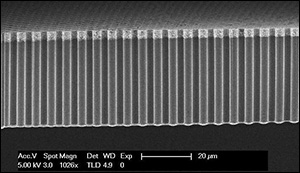University of Twente Boosts Efficiency of Solar Fuels Using Microwires
16. 1. 2018 | University of Twente | www.utwente.nl
Researchers at the University of Twente’s MESA+ research institute have made significant efficiency improvements to the technology used to generate solar fuels. This involves the direct conversion of energy from sunlight into a usable fuel (in this case, hydrogen).
Using only earth-abundant materials, they developed the most efficient conversion method to date. The trick was to decouple the site where sunlight is captured from the site where the conversion reaction takes place. By varying the density and length of the microwires, the researchers ultimately achieved a maximum efficiency of 10.8 percent.

They managed to achieve this by decoupling the site where the photons are collected from the site where the conversion reaction takes place. This is necessary because catalysts usually reflect light. Yet – to make the conversion as efficient as possible – you want them to absorb as much light as possible. It is important to achieve this decoupling at the microscale, because at larger scales the conductivity of the silicon microwires becomes the limiting factor.
Read more at University of Twente
Image Credit: University of Twente
-jk-




